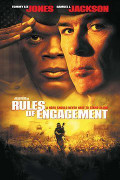
Directed by
William Friedkin
128 minutes
Rated MA
Reviewed by
Bernard Hemingway

Rules Of Engagement
Although the first thirty minutes of William Friedkin’s film is largely given over to an unrelenting action sequence that takes us from a V.C. attack on an American platoon in Vietnam in 1968 to a US retrieval mission on its embassy in Yemen, the real battle that the film is concerned with is in the courtroom where Col. Terry Childers (Samuel L. Jackson), a decorated 30-year Marine veteran, is facing a court martial for ordering his men to fire on Yemeni civilians on the aforementioned mission with the result that 83 civilians died. Childers asks his Vietnam comrade-in-arms, Colonel Hays Hodges (Tommy Lee Jones), to be his lawyer because he knows that the latter will believe him when no-one else will and both men know the difference between the realities and rules of engagement.
If those thirty minutes are long they do give us the substance of two men’s values as professional soldiers and a life-long friendship based on first-hand combat experience as they return to the trenches this time of the courrtroom. Add to this a committed prosecuting attorney (a first class performance from Guy Pearce) and as a courtroom drama, the film bristle with tension, the opposing sides, in the absence of any conclusive evidence, largely focussing on issues of credibility in order to persuade the jury of their case.
It is a testament to the strength of this aspect of the film that we can overlook the running issue of a missing video tape that might show what really happened when the crowd was fired on. As it turns out, and this is not a plot spoiler, for we know it will, it exonerates Childers. But if this was so, why does the smarmy National Security Adviser (Bruce Greenwood) destroy it? Surely that was all he needed to end the accusations (although, one might ask given that the Arabs are firing upwards at the marines and therefore not likely to have hit anyone what was Childers going to achieve by firing willy-nilly on the crowd). Plot-wise one also wonders how likely it would be that the prosecution would in a matter of days manage to find the VC captain who led the raid on Childers’ Vietnam platoon and have him appear in court to testify against Childers for the summary execution we see him commit in the film’s opening sequence.
Apropos of this matter, both with this incident and Childers’ order to fire on the Yemini - “Waste the motherfuckers” - the film touches on the gulf between the heat of battle and the regulations supposed to govern it. Rather than give this space however, Stephen Gaghan’s screenplay opts for the usual affirmation of Uncle Sam’s superior wisdom and the moral worth of allegiance to the flag (end titles which bogusly the story is taken from real-life neatly rewards the good and punishes the evil doers). And this leaves aside the highly generic treatment of the Yemeni as the faceless enemy with one particularly questionable scene revealing a little girl who lost her leg in the battle to be one of the Yemeni shooters.
All this sounds fairly damning but Jones’, Jackson’s and Pearce’s performances are enough to make this worth watching, After all, you know what can you expect of a mainstream Hollywood film, so to contain something above the average is a bonus.
Want something different?





